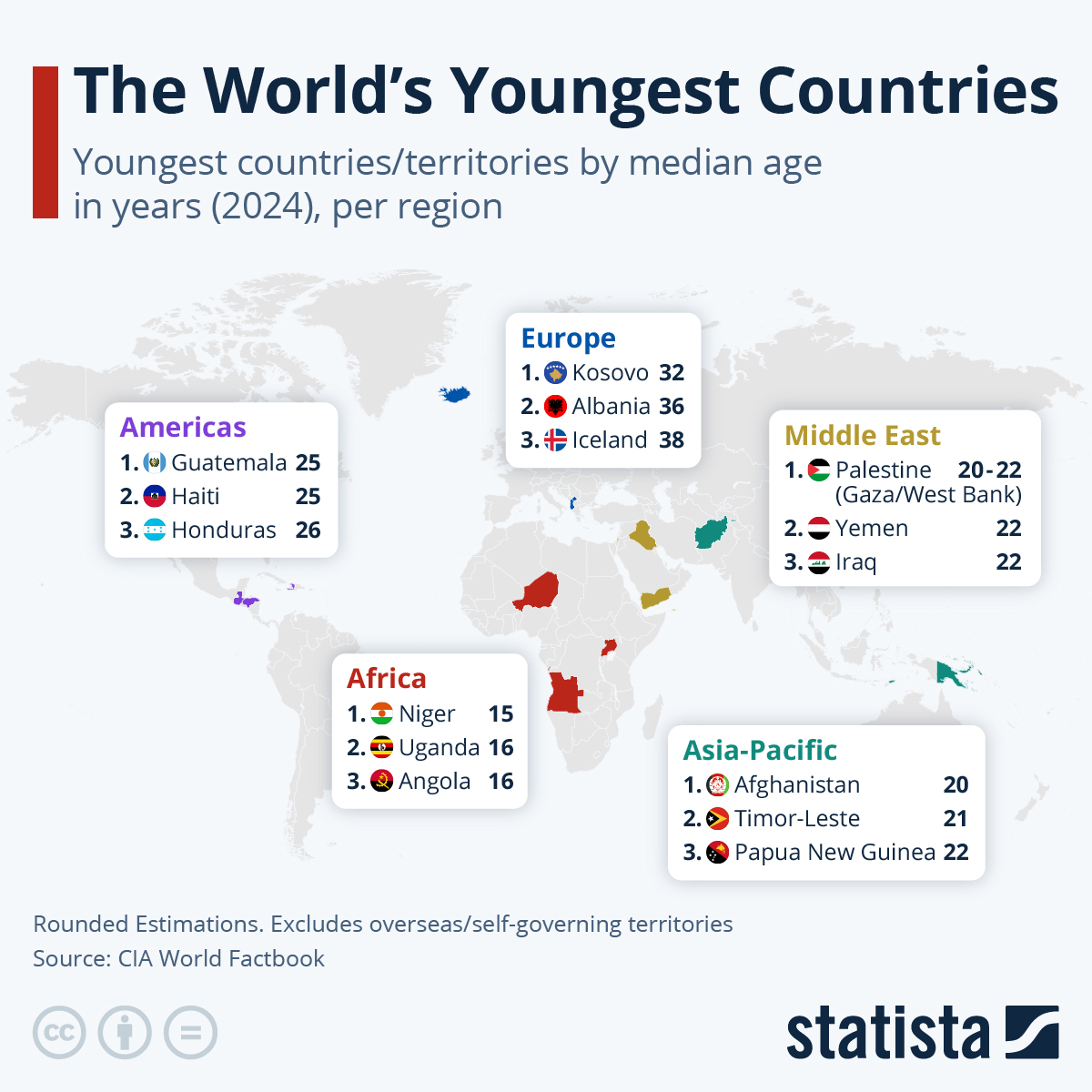
The youngest countries in the world are located in Africa.
As Statista's Katharina Buchholz details below, the youngest of them all is Niger at a median age of just 15 years - meaning that an equal amount of people in the country are older and younger than 15.
In the Middle East and the Asia-Pacific regions, the youngest countries and territories have median ages of around 20 to 22 years, while the youngest in Europe are much older. They are Kosovo at a median age of 32 years, Albania at 36 years and Iceland at 38 years.
You will find more infographics at Statista
The oldest countries in the world, among them Japan, Italy, Spain and Germany, have median ages between 47 and 50 years and are grappling with the demographic issue of a shrinking working-age population and its threat to economic growth.
Meanwhile, very young countries in Africa have the opposite problem, as their economies, institutions and education facilities are not able to provide for the a big number of children and young people they produce.
In the Central African nation of Niger, poverty and child marriage continue to pose problems and the World Bank observes that high fertility in poor countries will worsen health outcomes, reduce investments in human capital and lessen economic growth. The country is working to reduce child marriage and fertility, which is traditionally been associated with the chance at a wealthier life in the country and the region.
The 21 youngest countries are in Africa, also including Uganda, Angola and Mali with median ages of just 16 years.
The youngest territory outside of Africa is Palestine, with an median age of 19.5 in Gaza and 21.9 in the West Bank. This is followed by Afghanistan at 20 years, Timor-Leste at 20.6 years and Papua New Guinea at 21.7 years.
While the economic and development outlook in many African nations still being poor and with large families remaining the norm as a result, very young countries outside of Africa often had their developmental outlook startled by prolonged conflict or war, also including Yemen, Iraq and Haiti.
The youngest countries in the world are located in Africa.
As Statista’s Katharina Buchholz details below, the youngest of them all is Niger at a median age of just 15 years – meaning that an equal amount of people in the country are older and younger than 15.
In the Middle East and the Asia-Pacific regions, the youngest countries and territories have median ages of around 20 to 22 years, while the youngest in Europe are much older. They are Kosovo at a median age of 32 years, Albania at 36 years and Iceland at 38 years.
You will find more infographics at Statista
The oldest countries in the world, among them Japan, Italy, Spain and Germany, have median ages between 47 and 50 years and are grappling with the demographic issue of a shrinking working-age population and its threat to economic growth.
Meanwhile, very young countries in Africa have the opposite problem, as their economies, institutions and education facilities are not able to provide for the a big number of children and young people they produce.
In the Central African nation of Niger, poverty and child marriage continue to pose problems and the World Bank observes that high fertility in poor countries will worsen health outcomes, reduce investments in human capital and lessen economic growth. The country is working to reduce child marriage and fertility, which is traditionally been associated with the chance at a wealthier life in the country and the region.
The 21 youngest countries are in Africa, also including Uganda, Angola and Mali with median ages of just 16 years.
The youngest territory outside of Africa is Palestine, with an median age of 19.5 in Gaza and 21.9 in the West Bank. This is followed by Afghanistan at 20 years, Timor-Leste at 20.6 years and Papua New Guinea at 21.7 years.
While the economic and development outlook in many African nations still being poor and with large families remaining the norm as a result, very young countries outside of Africa often had their developmental outlook startled by prolonged conflict or war, also including Yemen, Iraq and Haiti.
Loading…






